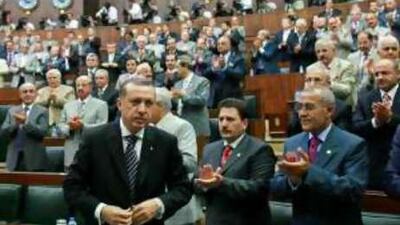ISTANBUL // Turkey's top court spent a second day yesterday deliberating whether to ban the ruling party, as tension mounted after a bombing in Istanbul that killed 17 people. The chief prosecutor, Abdurrahman Yalcinkaya, wants the court to ban the Justice and Development Party, the AKP, for what are alleged to be Islamist tendencies. He has accused the party of trying to introduce sharia law, pointing to a parliamentary decision to allow female students to wear the headscarf at university.
The AKP denies Mr Yalcinkaya's accusations. "The [court's] decision will shape Turkey's future," the pro-government daily Zaman said on its online edition yesterday. Some reports said the decision could come as early as tomorrow. Turkish security forces have blamed Sunday's attack on the Kurdish rebel group PKK, and said they were intended to destabilise the country. The group denied any involvement, but Turkish media said a PKK splinter group, the Kurdistan Freedom Falcons, or TAK, carried out the attack.
Newspapers also speculated that a right-wing organisation known as Ergenekon, which prosecutors say wanted to provoke a military coup to overthrow the government of Recep Tayyip Erdogan, the prime minister, could be behind the attack in the suburb of Gungoren, on Istanbul's European side. "It is always the same scenario," Hasan Cemal wrote in his column in the Milliyet newspaper. "Every time Turkey goes through a critical period, bombs explode, political crimes take place, murders are committed. In some dark places, it is being calculated that the political agenda can be shaken in this way and that non-democratic and illegal avenues will be opened."
Yesterday, Turkish fighter jets attacked Kurdish rebel targets in the Zab region and Qandil mountain in Iraq where they are based. The military said many in the group, believed to number about 40, were killed outside a cave at Mount Qandil. Turkish media, quoting unnamed police sources, reported yesterday the bombs in Gungoren consisted of TNT and that screws and other metal parts had been added to maximise the effect of the explosions.
"If it was by pure coincidence that the bombs in Istanbul exploded just before the Constitutional Court began its session to reach a decision in the trial against the [Justice and Development Party, or AKP], it was a coincidence that will not be seen as one," wrote Murat Yetkin, a columnist for the daily Radikal newspaper. Yetkin said the perpetrators wanted to provoke "clashes between Turks and Kurds".
Yesterday morning in Ankara, the 11 judges of the Constitutional Court convened for their second round of closed-door deliberations in the case brought by the prosecutor general against the AKP. Nothing was known about the exact contents of the talks or about the positions of individual judges that could shed light on a possible outcome. Most observers expect a verdict in the coming days, but the judges have said they will meet every day until they reach a decision.
Yesterday's talks went on for 12 hours until late in the evening but ended without a decision. A court official told waiting reporters in front of the court building in Ankara that the judges would resume their debate today. If the court dissolves the party, early elections are expected in the autumn. Mr Erdogan and 70 other leading AKP politicians could be barred from party politics for five years, although this would not necessarily preclude their standing as independent candidates at the next elections.
A legal expert, asked by the court to review the AKP case, concluded in his report that the party should not be banned, but the recommendation is not binding for the court. A ban requires the votes of at least seven of the 11 judges. Eight judges were appointed by Ahmet Necdet Sezer, a former president and known opponent of the AKP, so a ban is seen as probable. The judges could also reject Mr Yalcinkaya's accusations or find a middle way, for example, by cutting state funds for the AKP without banning the party.
Whatever the outcome of the AKP trial, the case is unlikely to put an end to the struggle between Turkey's Kemalist elites, who see themselves as guardians of the secular values of the country's founder, Mustafa Kemal Ataturk, and a rising class of conservative Muslims, led by Mr Erdogan. The AKP, which won 47 per cent of the vote in last year's general elections, is said to be quietly preparing the creation of a new party that could serve as a political lifeboat for Mr Erdogan's supporters.
"A decision to ban [the AKP] will not serve the interests and aims of those who think secularism has been defended," Sahin Alpay, a political scientist and commentator for Zaman, wrote yesterday. The new party, which is to replace the AKP, would benefit from the court decision at the next elections, Mr Alpay predicted. "It is highly probable that [the new party] will get even more support and that the opposition will be even more marginalised."
@Email:tseibert@thenational.ae

